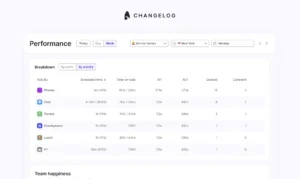
Customer service skills – Top 11 skills your CX team needs to develop

Much of customer psychology remains a mystery to service agents. They don’t know what the next few seconds of a conversation with a frustrated customer will turn into.
The bad news – one wrong word or action can cost your business loyal customers and sales.
The good news – customer service skills are attainable. You can help your CX team improve these skills so they can create impeccable customer experiences.
This post will discuss the top 11 customer service skills and ways to infuse these skills into your CX team’s everyday routine.
First things first ⬇️
What are customer service skills?
Customer service skills are traits your CX team needs to communicate with your customers and solve their problems smoothly and effectively. These skills ensure your customers are comfortable during the conversation and hang up happy and satisfied.
Good customer service skills combine both hard and soft skills, enabling a surfer (as we call service agents) to start on a positive note and maintain composure throughout the conversation.
While soft skills reflect your surfers’ ability to build customer relationships, hard skills emphasise problem resolution and customer satisfaction.
Why do customer service skills matter?
Customer service skills matter because they bring your business loyal customers and a positive reputation. They directly influence employee efficiency, customer retention rates, revenue, and operational costs.
Here’s what the numbers say ⬇️
- Research predicts a growth of $52.54 billion by 2030 for the global CX market.
- 94% of people would prefer the same brand after a positive customer service experience.
- 36% of consumers would wait to interact with a human agent for customer service.
These numbers point to a single truth – your CX team needs a firm hold on customer service skills.
List of 11 customer service skills
If you look at some skills in customer service resume examples, you will find two types of skills: core and advanced.
Core skills
Core customer service skills are must-haves for your CX team. Even while interviewing candidates, ask questions based on these core skills ⬇️
- Empathy
Put yourself in your customers’ shoes, see problems from their perspectives, and be sensitive towards them.
Empathy assures customers that there’s a sensible person to help them address their issues. It shows them support and enables your surfers to comprehend the emotions associated with the problem.
- Problem-solving
To find the best possible solution to the customer’s problem, probably in the first interaction.
The ultimate goal of customer service is to solve customer problems. It requires your surfers to anticipate the issue, find a solution, and either act on it or help customers take the necessary steps.
- Communication
To interact with the customers in a clear and confident manner, making them understand the issue and its resolution.
Customers can contact you via either of these channels – phone (59%), email (57%), or live chat (42%). Hence, your surfers must be polite and detail-oriented in both written and oral communication. They must skip technical jargon and unenthusiastic tone when interacting with customers.
- Active listening
To listen to customer grievances attentively, avoiding all distractions and understanding the exact issue.
Annoyed customers don’t like repeating their concerns. If you make them repeat, it can intensify sensitive situations. Your surfers must be receptive, asking the right questions and responding quickly with the correct answers. It helps customers realise that you’re giving them your full attention.
- Patience
Keep calm and respond with understanding when customers are flustered or angry because of their experiences.
Surfers must recognise their triggers and maintain composure while talking to disgruntled customers. They can’t afford to lose their patience at any cost. Doing so can harm your company’s reputation, destroying customer relationships.
How to improve customer service skills?
Two ways to polish your surfers’ core skills include ⬇️
Feedback
Your CX team can leverage three types of feedback to improve their customer service skills — direct customer feedback, manager feedback, and customer feedback reports.
It will help them reflect on their performance and determine their highs and lows. They’ll also understand the reason behind unsatisfactory experiences (if any) and take measures to work on specific skills.
Training
Ensure you have a detailed guidelines document for your CX team to follow. It must contain all the dos and don’ts of interacting with a customer.
Although your surfers must practise core skills themselves, you could help them by ⬇️
- conducting customer service training games like role plays to make surfers practise scenarios where they might lose patience or empathising with customers could be a challenge.
- taking sessions where you quote examples or hypothetical scenarios to make surfers grasp the diligent use of skills.
Advanced skills
Advanced customer service skills are good-to-have traits in your CX team. And you can devise specific methods to develop these skills.
- Product knowledge
46% of customers never look back to a brand whose employees are not knowledgeable. Scary, right?
Your CX team should possess the basic knowledge about your industry and an in-depth understanding of your product/service. It can’t be done in just one day-your team will need elaborate training sessions to understand different use cases.
Your surfers should be familiar with product specifications, usage guidelines, purchasing processes, troubleshooting methods, etc., to help customers efficiently.
CX teams should also clearly understand company policies to avoid any misconceptions. Additionally, they must know whom to direct the conversation to if they cannot answer specific customer queries.
How to improve ⬇️
- Equip your team with mentors to help surfers understand your product/service.
- Provide your team with clear and detailed product/process documentation.
- Establish communication between your surfers and the R&D team for technical assistance.
- Share a database of previous customer-surfer interactions with your surfers so they can reuse them to answer similar customer queries.
- Adaptability
Customer expectations are full of surprises. Your surfers never know what’s on their minds unless they read them during conversations.
This is when your surfers must portray their flexibility to adapt to various situations. They must mould their responses and tones based on the customers’ moods.
If the customer cooperates, the surfers can follow the standard process smoothly. But if they are restless and frustrated because of a bad experience, the surfers might have to handle the situation without losing control of the conversation.
Adaptability also applies to the customer service channel your surfers use. Customers may switch from live chat to in-person calls in minutes, and your team should be flexible enough to switch between channels and continue the conversation.
How to improve ⬇️
- Keep your CX team updated about company policies, procedures, and product/process documentation changes.
- Help your team with organisational skills-ensure they have all the necessary documentation arranged according to the priority and complexity of the issues.
- Offer your team creative opportunities during training sessions so they can think of out-of-the-box ideas to handle customers.
- Make your surfers contribute to these sessions, helping them overcome their fear of being judged.
- Positive attitude
Customers need trust and support from your CX team. The only way to show this is to have a positive attitude towards the situation.
Customers should feel that their problem will be resolved when they contact a surfer. For this, the surfer must choose their words carefully, ensuring they don’t hurt customers’ sentiments.
Your surfers must reassure customers that their issue will be addressed. If not immediately, within the shortest possible time. Also, surfers must keep customers updated about ticket resolution to reduce customer stress.
How to improve ⬇️
- Make your team members take feedback as friendly advice instead of criticism. Ensure that they take your feedback objectively instead of personally.
- Set boundaries for handling demanding customers. Try simplifying workflows for your team using technology to relieve them of frustration.
- Time management
Customers can abandon you when put in the back seat, even for a few seconds. And with customer service in question, time is a luxury for your CX team.
Your surfers can’t afford to keep customer conversations on hold, no matter what channel they connect on. Efficient time management will help them manage multiple tasks, from accepting chat/call requests to finding solutions and simultaneously providing fixes for customer issues.
How to improve ⬇️
Use a shift management software like Surfboard.
Surfboard’s key features, like activity scheduling, help schedule your team’s time based on priorities, surfers’ preferences, and training needs.
- It helps you divide your surfers’ time evenly between all the tasks while ensuring an adequate number of surfers for every activity.
- It allocates time for training activities apart after optimising schedules for essential tasks.
To learn more, look at how Mercuryo (a payments infrastructure platform) achieves a 90%+ service level using activity scheduling.
- Collaboration
Collaboration can be your team’s biggest asset.
There are times when surfers jump between multiple departments to resolve customer queries. Hence, they must collaborate with different teams (like sales, finance, and R&D) to ensure timely resolution to customer issues.
Also, your surfers need collaborative teams to share their workload, ask for help, and work closely with customers to understand their issues. They shouldn’t hesitate to contact the right team when required.
Collaboration skills also help surfers stay productive, brainstorm ideas, and improve relationships with their colleagues.
How to improve ⬇️
- Give your surfers the freedom to connect with other teams based on customers’ requirements.
- Create a common communication channel for the different teams, like marketing, sales, product, finance, etc.
- Share each department’s SPOC (Single Point of Contact) names with your CX team so they can connect with them immediately when in need.
- Using tools like Slack that integrate with your workforce scheduling software. This way, your surfers don’t have to juggle different tools for everything.
Surfboard’s Slack integration is intuitive and easy to use. Surfers can link their Surfboard schedules with Slack to receive notifications about switching activities, breaks, time-offs, and shift ends.
- Speed
74% of customers trust companies that quickly respond to their concerns. It is possible when your surfers efficiently manage their time, have the necessary resources, and communicate swiftly with the customers.
While it’s challenging to answer multiple queries simultaneously, the time your surfers take to respond to each question can make or break the deal. Surfers must know what requests can wait and which ones need immediate attention.
Maintaining speed also means realising time constraints and requirements for every query. Your surfers must prioritise issues that require more time to resolve and convey the same to the customers. It will help surfers move to other issues that may get resolved quickly.
How to improve ⬇️
Surfboard’s integrated forecasting capabilities can help you maintain the required speed for your CX team.
- It connects with your existing tools-ticketing software, contact channels, and collaboration platforms.
- It extracts historical data to predict ticket inflow and staffing levels 12 weeks in advance.
Use this data to appoint sufficient surfers so they can respond to customers quickly.
Also, with detailed inflow forecasts, you’ll know which channel will need more employees at a particular duration. It will avoid understaffing during peak periods, helping you maximise the ROI of your scheduling software.
Elevate your CX team’s customer service skills with Surfboard
There’s more to add to this customer service skills list! Still, no matter how many skills you add, it wouldn’t reap results unless you have the tools to accelerate your CX team’s development.
Surfboard enables managing your workforce’s schedule, planning activities, and giving them internal visibility. It helps teams to independently work on their progress while you ensure it’s not impacting their work routines.
Book a demo to understand how Surfboard can help your CX team boost their performance.
FAQS
What are good customer service skills?
Good customer service skills involve three main traits ⬇️
- Empathy – to understand customers’ emotions and perspectives behind their issues
- Problem-solving – to help customers navigate through the problems and find a solution
- Communication – to interact with customers concisely and confidently.
What are the 3 important qualities of customer service?
The 3 crucial customer service qualities include ⬇️
- Professionalism – to stay within limits and keep calm while talking with customers.
- Patience – to keep hold of emotions and never lose control even with the most challenging customers.
- People-first attitude – to keep customers’ concerns above everything else.
What are the basics of customer service?
The 4 basic principles of customer service include ⬇️
- Personalisation – know what your customers want and provide them with the exact solution.
- Competency – equip yourself with product/service knowledge to offer the right solution to your customers.
- Convenience – give your customers different channels to connect with you and seek help.
- Proactiveness – don’t wait for your customers to come for help; anticipate potential issues and reach out with a solution.



